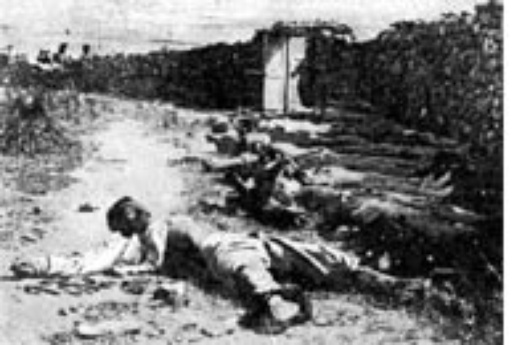A denial that prejudices everyone
Published on
Translation by:
 nathalie harris
nathalie harris
On April 24 2005, we will observe the ninetieth anniversary of the Armenian genocide carried out by the Turkish state. But recognition of this crime is not uniform across Europe
 On April 24 1915, hundreds of Armenian intellectuals in Constantinople were arrested. This marked the beginning of the first genocide of the 20th century, a century which was to see many more. From May 1915 to the end of 1916, 1,200,000 people - nearly half the Armenian population of the Ottoman Empire - were massacred under the Ittihad (Young Turks) government of Turkey.
On April 24 1915, hundreds of Armenian intellectuals in Constantinople were arrested. This marked the beginning of the first genocide of the 20th century, a century which was to see many more. From May 1915 to the end of 1916, 1,200,000 people - nearly half the Armenian population of the Ottoman Empire - were massacred under the Ittihad (Young Turks) government of Turkey.
Denial
Although Turkey does not deny that these massacres took place, it has consistently refused to label them ‘genocide’ as it maintains that they were not organised by the state. This failure to recognise the state’s involvement in these deaths is one of the most frequent criticisms levelled at Turkey. In Europe, an Armenian community of 275,000 people, 220,000 of them living in France, fight for the right of remembrance. For these people, it is unbearable that Turkey's successive governments continue to deny the genocide. These Armenian immigrants, who are less affected by rising tensions between the two communities back home, can afford to be more articulate on the subject than those who still live in Turkey.
Although it was not outlined as an EU adhesion condition on 17th December 2004, Turkey’s acknowledgement of the Armenian massacres as genocide is crucial to the question of whether it should join the European Union. The European Parliament recognised the Armenian genocide in 1987. Countries such as Cyprus, Russia, Bulgaria, Greece, Belgium, Sweden, Italy, the Vatican, France and most recently Switzerland have done the same.
Hypocrisy
But it is not enough to recognise the Armenian genocide. If Turkey's denial is not condemned, the recognition is merely a political declaration of no consequence. Throughout the numerous countries that condemn Turkey's negation, only the denial of Jewish and Gypsy genocides have been punished by law. This is the case in France, Germany, Austria, Belgium and Luxembourg. While this may seem normal in countries which officially recognise only the genocide of Jews, the French and Belgian situation is more shocking: why recognise the Armenian genocide but allow it to be denied? To respect the right of freedom of expression?
In Europe, it is difficult to find examples where the denial itself of the Armenian genocide has been condemned. The decision of a Swiss tribunal to refuse to sanction a Turk who insisted on defending the version of history he had learned in school is not without reason. It highlights the problem of state denial and how it imbues its schoolchildren with a deformed view of history.
It is possible to hope that European pressure will mount, even if nobody is asking that Turkey compensate its victims' descendents or change its borders. A legislative evolution is foreseeable. Germany is working towards an acknowledgement of genocide and France has drafted new laws directed at condemning the denial. If Turkey recognised its crimes of the past, the Armenian community would be satisfied and public recognition would prevent many Turks from unintentionally defending a historic lie. It would be a symbolic act - benefiting everyone.
Translated from Une négation préjudiciable à tous


